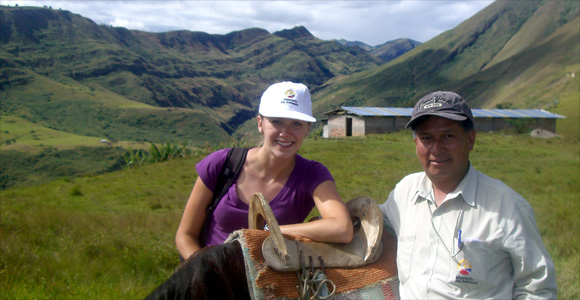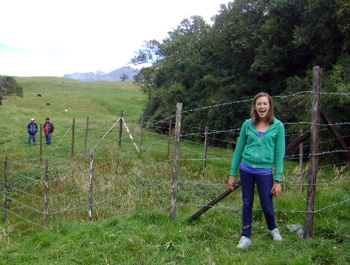
Lisa Beem ’14 recently spent six weeks in South America on a summer internship alongside biologists and engineers in Ecuador’s Ministry of the Environment as they worked vigilantly to preserve the growth of healthy forests and to protect clean drinking water.
The experience changed her.
“I gained a passion for issues related to water,” says the 20-year-old Scripps junior, who is majoring in environmental analysis.
Before flying to Ecuador this summer, Beem searched for an internship program in a Spanish-speaking country that would give her a measure of independence so that she could tailor her experiences. Natalie Butterfield ’12, a fellow Scripps College student, suggested Beem customize her own internship through El Nomad, given that Butterfield completed an internship through the Ecuadorian cultural immersion program and enjoyed it.
 “My work schedule changed day to day, and I had to be prepared every morning for something completely different than the day before,” says Beem, who was an intern in the ministry’s office in the city of Cuenca in southern Ecuador, about nine hours from the nation’s capital, Quito.
“My work schedule changed day to day, and I had to be prepared every morning for something completely different than the day before,” says Beem, who was an intern in the ministry’s office in the city of Cuenca in southern Ecuador, about nine hours from the nation’s capital, Quito.
Beem, who speaks conversational Spanish, enjoyed every minute of her fieldwork.
“The mountains in Ecuador are blessed with naturally clean and safe drinking water,” says Beem. “The government is working hard to protect them.”
The internship made her more aware of the challenges governments throughout the world face when attempting to protect safe water sources for their citizens.
“One day, my co-workers and I investigated a complaint that a woman was burning patches of forest to clear land for farming,” says Beem.
Beem noticed that the fire was on a slope near a small body of water, which provided drinking water for a city in the valley below.
“I saw how preserving clean water is affected by a multitude of environmental, social, cultural, political and economic factors,” Beem says. “I am passionate about continuing my studies on issues related to water.”

